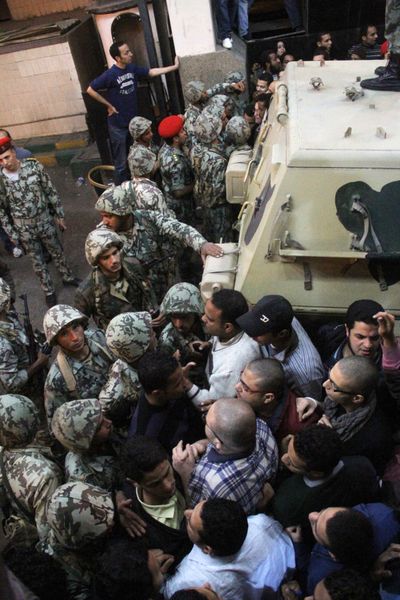Cairo crowd storms security agency office
Torture files, fate of missing sought after army slow to act

CAIRO, Egypt – Trudging through dungeon-like cells and mounds of shredded documents, hundreds of Egyptians on Saturday surged into the Cairo headquarters of the dreaded State Security Investigations Service apparatus for an unprecedented look inside buildings where political prisoners endured horrific torture.
Some former prisoners sobbed as they saw their old cells, recalling electric shocks and severe beatings. Families held passport photos of missing relatives and were desperate to explore the dank chambers for clues to their fates.
Dismantling State Security, the shadowy and all-powerful intelligence force, was a key demand of protesters who forced the resignation last month of Egyptian President Hosni Mubarak. When the military-led interim authority failed to dissolve the agency immediately, protesters in Cairo and the port city of Alexandria descended on State Security offices this weekend to seize files they hoped would cement Mubarak’s legacy of prisoner abuse and disappearances.
“I thought my brother would be found there,” said Leila Mahmoud, 47, who was distraught when she learned the buildings had been evacuated. “He was taken on April 2, 2005, and we’ve been looking for him since then. We haven’t heard a word from him since. Not a word.”
Some activists also were looking for evidence related to Egypt’s role in the U.S. government’s longtime practice of extraordinary rendition, the transfer of U.S.-held detainees to foreign soil where harsher interrogation techniques could be used.
Protesters carted off armloads of files and turned them over to a prosecutor who arrived on the scene.
The Egyptian Organization for Human Rights, an independent nonprofit, puts the number of political prisoners at around 17,000. Official government figures are much lower, an estimated 500.
Human Rights Watch, the international advocacy group, has said in its reports that “torture in Egypt is a widespread and persistent phenomenon.”
For those who were jailed at the complex, the memories are haunting.
“I saw people’s nails being ripped out and people hung from the ceiling by their arms or legs,” said Adel Reda, 39, trembling as he recounted his nine months inside the complex. “They would throw our food in sand before giving it to us and splash us with cold water day and night. Sometimes it was so dark you couldn’t see your hands.”
Egyptian military tanks were positioned outside the security structure and the army’s elite Thunder Squad pleaded with protesters not to enter the forbidding complex. Egyptians chanting “Down with State Security!” stormed past them and flooded into the building.
Since Mubarak’s ouster on Feb. 11, protesters have kept up pressure on the ruling military leadership to dissolve State Security and replace it with a scaled-down intelligence force headed by a civilian. Another chief demand is the speedy prosecution of Mubarak-era security chiefs on charges related to abuse of power and using extrajudicial means to crush dissent.